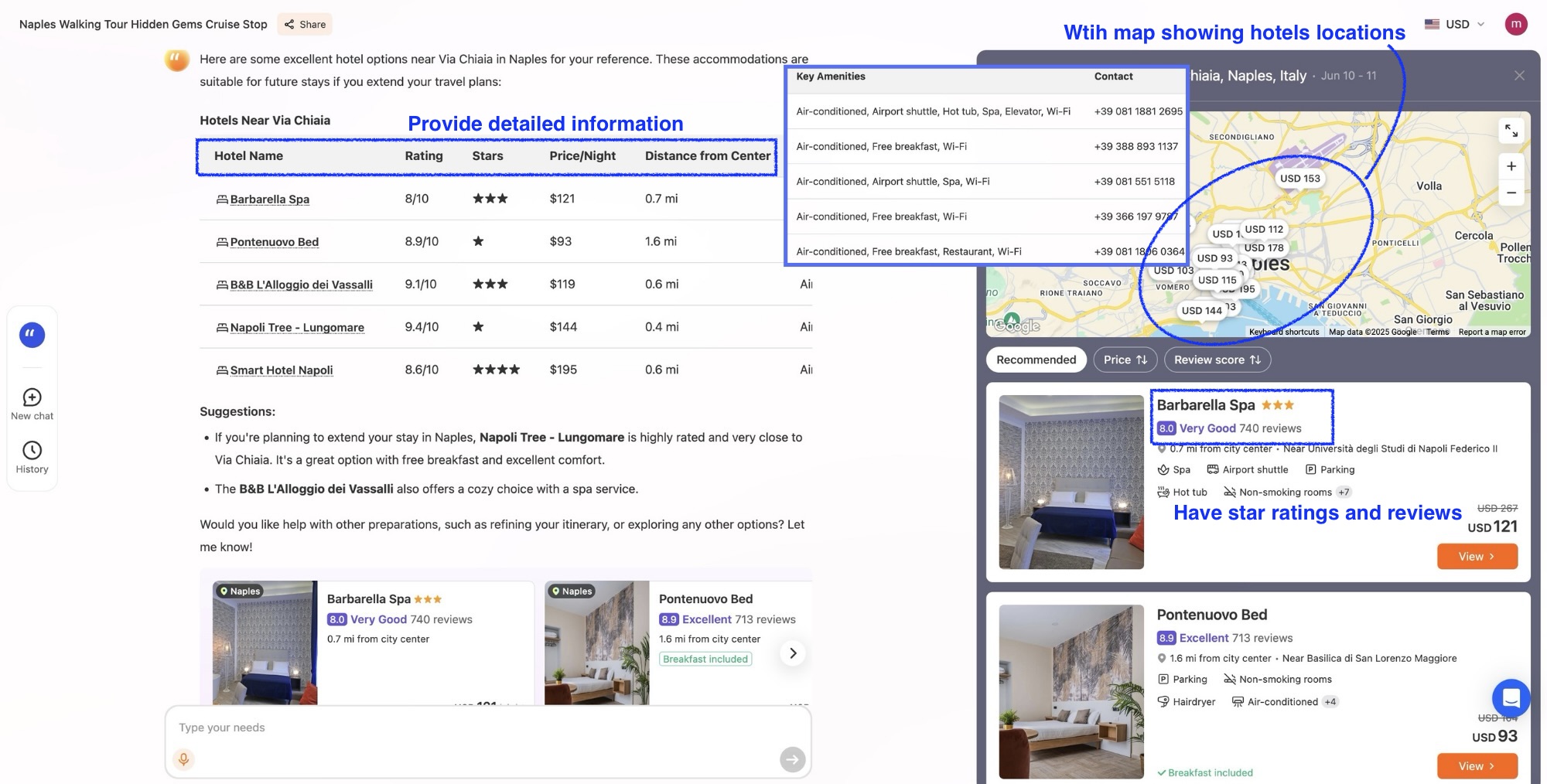Making Every Hour Count
Cruises offer convenience, but land time comes with pressure. You disembark, check your watch, and suddenly feel paralyzed by possibility. On our Mediterranean route, we had one shot at Naples—just under seven hours from gangway to gangway. While others hovered around tourist brochures or flagged taxis without a plan, I opened iMean, a leading AI-based travel tool.
Within minutes, it took in my location, the available time window, and suggested a walking loop through historic quarters, a seafront espresso stop, and a leisurely return that left no risk of missing the ship. No preloaded tour. No panic. Just clarity. And most importantly, it understood that I wasn’t looking for a checklist—I was looking for rhythm.

Local Over Landmarks
Rather than racing from one landmark to another, I wanted to get a sense of Naples itself—the street energy, the local flavors, the unexpected moments. Naples isn’t short on iconic sites: Pompeii, Mount Vesuvius, the Royal Palace. But seven hours won’t fit them all. I told the automated itinerary builder that I preferred local atmosphere over lines, and that I wanted to be back at the ship by 3:30 p.m. The system curated a sequence through the Spanish Quarter and down to the Lungomare promenade.


I had coffee at a third-generation café that overlooked the bay, browsed a ceramics shop that didn’t sell refrigerator magnets, and passed an impromptu street performance near Piazza del Plebiscito. It felt like I was moving with intention, not wandering blindly. And it felt good to be on my own time, not locked into a prepaid group tour.
Hotels That Stick With You
Even though I was day-tripping, I kept thinking about coming back. That’s when I noticed that the tool—beyond just planning my walk, surfaced hotel options along my route. Using iMean’s ai hotel search, I marked a few interesting stays for future trips. One boutique place near Via Chiaia had high walkability scores, fiber Wi-Fi, and staff who spoke English and French.

I saved it to my favorites, which syncs with my profile. Next time I pass through Southern Italy—or if I ever do a longer Amalfi coast swing—I can pull up those options instantly. What struck me was how the ai hotel finder didn’t just sort by price or rating. It read my prior preferences and presented hotels that were close to the areas I explored—not halfway across town. That kind of memory adds serious value.
Starting Early in Barcelona

This wasn’t my first experience using the platform. We boarded in Barcelona, where I’d flown in two days early. That mini pre-cruise vacation gave me a chance to recover from jet lag and test the tool’s broader trip features. With ai for flight tickets, I compared flexible departure dates from Chicago and got a one-stop itinerary that landed me at El Prat by early afternoon.
I avoided overnight flights and got a solid night’s rest before boarding. I didn’t use a travel agent. I used iMean’s AI travel planner, which adjusted for time zones and pointed me to a non-chain hotel in Eixample with a late check-in and a killer rooftop. It even flagged nearby attractions I could walk to without overpacking the schedule. That’s when I realized this wasn’t just an app—it felt like an AI trip assistant.
Smarter With Each Stop
Each port day became smoother because of what I’d learned using the tool in Barcelona. The beauty of a travel planner powered by AI is that it doesn’t assume you’re one type of traveler. It learns. In Marseille, our next stop, I had a tighter window and wanted to explore near the port. I just adjusted the filters: low walking range, café access, outdoor market. The tool pulled up a short list of routes and rest stops that respected my request.

And when we had unexpected rain in Genoa, the same planner rerouted my walk through covered arcades and indoor galleries. That’s adaptability you can’t get from paper maps or static guides. With each trip, iMean seemed to know me better.
After the Cruise Ends
As the trip wrapped up, I knew I wasn’t done yet. Since the cruise ended in Nice, I added two days before flying home. I used the ai travel booking tool to compare flights from three regional airports and found a fare out of Marseille with a connection in Munich that got me home before dinner.

With the ai flight finder, I could see total travel time—not just departure and arrival—and even factored in how long it’d take to reach each airport from downtown. That flight cost me less than a change fee I would’ve paid had I guessed wrong earlier in the process. My hotel in Nice? A charming, third-floor walk-up overlooking a morning market. Booked in two taps through the iMean hotel search. It wasn’t sponsored, wasn’t pushed. It was just the best fit.
A Tool for Travelers Like Me
What I realized at the end of this cruise was how little room there is for indecision when your hours in a city are numbered. Cruise travelers are often stereotyped as lazy planners. But in truth, they’re some of the most time-pressed tourists around. You have a fraction of a day to get it right. That’s where a smart travel planner shines.

It’s not trying to sell you packages. It’s showing you what’s realistic. And for people like me, who love travel but hate being rushed, it offers the one thing money usually can’t buy: time, well spent. When every hour counts, confidence in your plan becomes as valuable as the view itself. For those quick-stop, high-pressure travel days, don’t overthink it. Just let a travel ai agent take the wheel.

%20(8%20x%206%20%E8%8B%B1%E5%AF%B8%20(83).jpeg)



